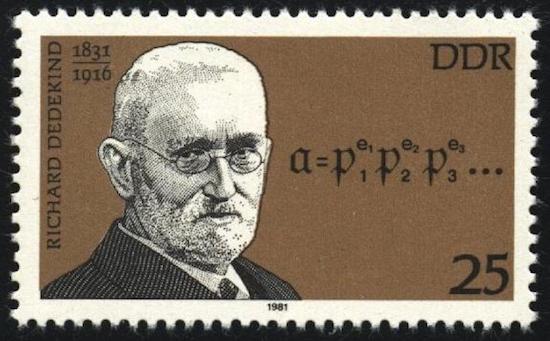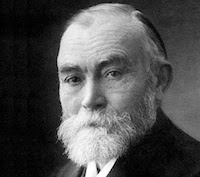
I shall soon have a salacious update about Jane Doe, the leggy redhead who pretends to be a devout Christian woman, and who fucks on demand, ready to go. I also have another critical theory article in the works. In the interim, I thought I’d talk a bit about one of my favorite historical characters. Problem is, you can’t really understand him without understanding the people he influenced. If you read to the end of this article, you’ll see that he would have agreed that context is important in any discussion of semantics, and so we begin with his peers.
Up above, we have our brother Richard Dedekind (you pronounce his first name RYE-card). Dedekind was the philosopher who gave us the rigorous definition of the real numbers, by taking a previously constructed notion (the naturals, constructed via set theory), adding the notion of series, and further logically defining the irrationals with the eponymous “Dedekind Cut” that incipient pure-mathematicians learn in their sophomore years of undergrad. Much of his work in this area was clarified and logically expanded by the philosophers-of-language Alfred North Whitehead and Bertrand Russell, in Principia Mathematica Vol. 1.
Oh and the chair of Dedekind’s thesis committee, when he went and got his graduate degree in philosophy? It was Carl Friedrich Gauss. No shit.
Philosophy and mathematics have been tied together since Plato, but contemporary analytic philosophers tend to be especially prone to the logicizing everything, including mathematics. Who can we blame for this? My best guess as the culprit was a man named Gottlob Frege.

Frege was an “idiotic” 19th century MGTOW* philosopher who was concerned with semantics. Before I go further, I’ll recall one of my students coming up excitedly to declare that he had begun reading someone named FREEJ. It took me a minute to realize that he was talking about Frege. As I told that kid, you pronounce his name FRAY-guh.
Frege was always very curious about conceptual life, and one of his main concerns was the notion of the word, as opposed to the meaning of the word, as it exists. So what is a word? It’s sound-waves, spoken and listened to, or its an inky squiggle, and the light-waves that carry it to the reader’s eye. Before anyone can make any sense out of language or meaning, one must have a metalanguage to communicate precisely in, and Frege was the first person to carry out the work of creating a logical way to describe what was going on in the object language (of German, in his case).
He published his Begriffsschrift in 1879. This is, as near as I can tell, the first rigorous primer on mathematical logic, in human history. He covers first-order predicate logic, and begins the construction of a second-order logic, allowing for the quantification over relations. In this regard, Frege was the first person to realize that one could logicize the notion of the mathematical proof.
 Given the consistency of Frege’s philosophical system, he became convinced that one could logicize the whole of arithmetic. What this means is that all arithmetical operations and axioms could be reduced to, or were equivalent to, axioms and operations in his logical metalanguage. He published his best known book, the Grundlagen, in 1884. You can (and should) download it in English here.
Given the consistency of Frege’s philosophical system, he became convinced that one could logicize the whole of arithmetic. What this means is that all arithmetical operations and axioms could be reduced to, or were equivalent to, axioms and operations in his logical metalanguage. He published his best known book, the Grundlagen, in 1884. You can (and should) download it in English here.
The primary thesis of Frege’s Grundlagen is that only in sentences do words have meaning. This seems counterintuitive, given that sentences are constructed out of words. Frege insists that no one had ever properly thought about how meaning erupts in the lifeworld of a listener or a reader before, and his arguments had merit. In order to properly understand a natural language, we have to understand the various meanings that each word can project, and how to pre-judge on the fly what people say when they’re saying the word, based upon where it appears in a sentence, and what words surround it. He wrote an accessible paper, entitled Sense and Reference, which can be downloaded here.

This is the classic Marxist take on philosophy. Marx hated to be known as a philosopher, and was famously quoted as denouncing philosophers as “professional dreamers,” who spend their lives trying to explain things that they ought to be changing.
A large part of my work on this blog is the cultural appropriation of Marx and his descendants (including post-Marxist thinkers, like Marcuse and Althusser). I do this mainly because Marx and his ideological descendants are useful to antifeminist men in a strategic sense, but it’s also fun to do it because it gets feminists, who seem to think Marx was on their side (hint: he wasn’t) all upset.
Frege is a good example of a philosopher who did change things. The reason there are “pure mathematics” and “theoretical physics” programs at most tier-one and tier-two universities is due to him. Of course, “pure mathematics” and “theoretical physics” are deprecated by many technocrats as “just philosophy programs;” but, good practical stuff comes out of them, like some of the parts of the intel chips inside the average computer, ya know.
As for what gets women wet? Well, none of it, in my experience. Dedekind, Cantor and Frege* were, as near as I can tell, MGTOW brothers who never had steady girlfriends. Gauss and Whitehead were married monogamists. Bertrand Russell was a notorious playa, but it almost certainly wasn’t because of his skill as a mathematician or philosopher.
* Edit 9 May:
Frege was not MGTOW. He was apparently briefly married to a woman who died young. From Britannica dot com:

Credit to Gunner Q for the correction. Show him some love at his blog.
For the record, I was referring to Nietzche & friends with whom my SocJus-leaning professors had quite the fascination. So far as my undergraduate education was concerned, Euripides was more influential than Aristotle, Christianity is a mistake that Islam will soon conquer for the good of humanity and the greatest American ever was Ben Fong-Torres of Rolling Stone magazine. Per the University of California.
Suffice to say, I can watch the current students of my alma mater getting run over while protesting in traffic on youTube. That’s what they deserve for thinking physics is a tool of the patriarchy.
Frege was a MGTOW? Cool! *hits Infogalactic for more* Wait, he got married at age 39 to a 31yo. Not a good sign. But I digress, it sounds like I’ve been using the second-order logic he invented without ever knowing who he was.
I should take your class.
‘ it.s also fun to do it because it gets feminists, who seem to think Marx was on their side (hint: he wasn.t) all upset.’
So wait…Marx was actually a misogynist and a tool of the evil Patriarchy?